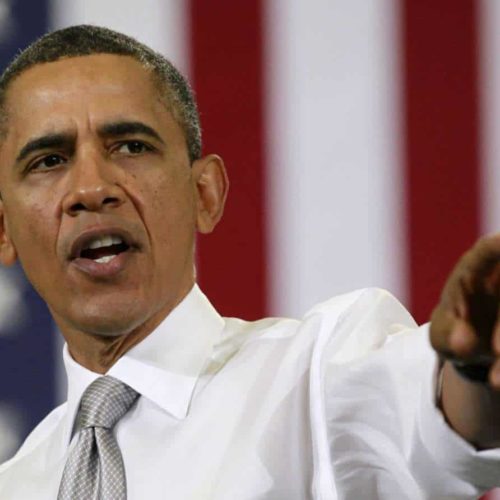Introduction
President Obama has repeatedly and falsely claimed that “right now, we’re scheduled to spend nearly $1 trillion more” in tax cuts for the “wealthiest 2 percent of Americans.” That’s simply not true. The Bush tax cuts — which Obama and Congress extended for two years — expire at the end of this year, so any plans to “spend” beyond Dec. 31, 2012, would require Congress to act again.
The White House told us that the president is referring to the $968 billion that “we save” over 10 years by allowing the Bush tax cuts to expire as scheduled for high-income wage earners and returning the estate tax rate to 2009 levels. But that’s money “saved” compared with extending the expiring cuts, not compared with current law. The fact is that the U.S. is not “scheduled to spend” that money and can’t spend it without changes to current law.
On the day he released his fiscal year 2013 budget, Obama visited Northern Virginia Community College in Annandale, Va., to discuss his budget proposals. He talked about “shared responsibility” — referring to his belief that the Bush tax cuts should be allowed to expire, as planned, at the end of 2012 for the families making more than $250,000 a year and individuals earning more than $200,000.
Obama, Feb. 13: “Right now, we’re scheduled to spend nearly $1 trillion more on what was intended to be a temporary tax cut for the wealthiest 2 percent of Americans. We’ve already spent about that much. Now we’re scheduled to spend another trillion.”
This has become a standard line in the president’s stump speech as he begins to campaign for reelection in earnest. He made a similar statement in his Jan. 24 State of the Union address and again and again in a string of follow-up speeches in Arizona, Michigan and Iowa.
Obama, State of the Union, Jan. 24: “Right now, we’re poised to spend nearly $1 trillion more on what was supposed to be a temporary tax break for the wealthiest 2 percent of Americans.”
The president often refers to families earning more than $250,000 a year (and individuals earning more than $200,000) as “the wealthiest 2 percent of Americans.” He did it throughout the debate in the final months of 2010, when he failed to convince Congress to allow the Bush tax cuts to expire as scheduled on Dec. 31, 2010, for “the wealthiest 2 percent of Americans,” and keep them for those earning less than that. We figured — correctly — that the president was referring to the temporary income tax cuts enacted by Bush in 2001 and 2003 and extended by Obama in 2010.
But we were puzzled by Obama’s repeated claim that the U.S. “right now” is “poised” to spend “nearly $1 trillion more” on the Bush tax cuts. The fact is that when Obama and Congress negotiated a two-year extension of the Bush tax cuts for all taxpayers, the nonpartisan Joint Committee on Taxation estimated it would cost $363.5 billion through Dec. 31, 2012. That’s not close to “nearly $1 trillion” and that was the cost for all taxpayers, not just the wealthy.
We asked the White House to explain the president’s claim. In an email exchange with us, the White House pointed us to Table S-9 on page 236 of the budget summary tables. The White House said that the federal government would realize a “combined savings” of $968 billion by allowing the income tax cuts to expire for high-income taxpayers and returning the estate tax to 2009 rates.
But saving money is not the same thing as spending money if the payments are automatically scheduled to stop. By the president’s logic, a car owner is scheduled to spend $36,000 in car payments over the next 10 years, even though the $300 monthly car payments are due to end on Dec. 31, 2012. Unless, of course, the car owner goes out and buys a new car. Likewise, the only way the tax cut can be extended beyond 2012 is if Obama signs a law extending it, or if Congress overrides his veto — or if Obama loses reelection and the next president retroactively reinstates the tax cut.
It’s true that Republicans would like to extend the Bush tax cuts, and there is legislation that proposes to make them permanent. But right now the Bush tax cuts are due to expire, so claiming the U.S. is “scheduled” or “poised” to pay “another trillion” is just wrong.
In delivering his $1 trillion talking point in Michigan, the president was interrupted by a member of the audience, who shouted out, “That’s not fair!” The president agreed. “That’s not fair,” he said. To which, we would add: It’s also not true.
It would be true, however, if the president said it would cost the U.S. nearly $1 trillion in lost tax revenue to extend the Bush tax cuts for the wealthiest 2 percent of Americans for another 10 years and return to the 2009 estate tax rates.
Now, Obama also said that “we’ve already spent” about a trillion dollars on the Bush tax cuts. It wasn’t clear whether he was talking about lost revenue from just the wealthy or all taxpayers. The tax cuts cost the federal government $1 trillion in lost revenue over 10 years from all taxpayers, according to a December 2010 report by the nonpartisan Congressional Research Service. And, as we said earlier, the two-year extension cost an additional $363.5 billion in lost revenue. Other partisan groups have put the figure much higher. Citizens for Tax Justice puts the total at more than $2 trillion over 10 years. The Tax Foundation says that “there is no definitive answer” for how much the Bush tax cuts cost in lost revenue.
– Eugene Kiely

Join the conversation
Show Comments